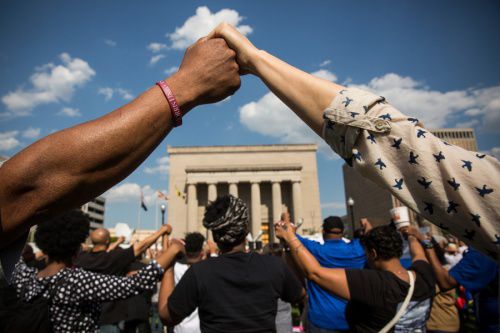The head of the U.S. bishops’ conference pledged support for reconciliation and healing efforts in areas around the country that have been the site of racial tension and violent clashes between police and citizens. “Promoting peace and reconciliation is the only way forward. And we must constantly strive to achieve these goals, trusting in the Lord to lead and guide us, accompanied by his merciful love,” said Archbishop Joseph E. Kurtz of Louisville, president of the U.S. Bishops Conference, in a June 10 statement. Noting the racial tension and violence that has plagued cities including Ferguson, Mo., a suburb of St. Louis, where the U.S. bishops gathered last week for their general assembly, and Baltimore, where the bishops gather annually for their fall assembly, he said that the Church must take up the cause of promoting healing along with other civic and religious leaders. “We mourn those tragic events in which African Americans and others have lost their lives in altercations with law enforcement officials. These deaths have led to peaceful demonstrations, as well as violent conflicts in the streets of our cities,” he said. The archbishop first proposed that Catholics pray for peace and healing, followed by the study of scripture and Catholic social teaching “in order to gain a deeper appreciation of the dignity of all persons.” Building on these steps, Catholics should strive to “encounter more fully” all those of different racial backgrounds, he continued. Similarly, Catholic parishes and neighborhoods should seek ways to “be truly welcoming of families of different racial and religious backgrounds.” Finally, Archbishop Kurtz encouraged people to get to know local law enforcement officers, saying that unfortunately in many communities, there exists “an alienation of communities from those sworn to protect them.” “Let them know of our support and gratitude,” he said. “And encourage young people to respect all legitimate authority.” Recalling the late Archbishop of St. Louis, Cardinal Joseph Ritter’s integration of Catholic schools years before the Supreme Court’s 1954 decision in Brown v. Board of Education, Archbishop Kurtz said the Church has long been “at the forefront of promoting justice in racial tensions”. Overall efforts for reconciliation must address the roots of racially charged violence in cities, he said. “A violent, sorrowful history of racial injustice, accompanied by a lack of educational, employment and housing opportunities, has destroyed communities and broken down families, especially those who live in distressed urban communities.” Last summer, protests and heavy police action followed the death of Michael Brown, an 18 year-old African American of Ferguson, Mo., who was shot by Ferguson police officer after a confrontation. This year, demonstrations followed the April 19 death of Baltimore resident, Freddie Gray, from injuries sustained while being transported following an arrest by Baltimore police. While hundreds of people protested the 25 year-old African American’s death peacefully, some turned violent resulting in the arrest of more than 200 people across the city. Archbishop Kurtz said that today, the words of the U.S. Bishop’s 1979 pastoral letter “Brothers and Sister to Us” still hold true when it named racism as “a grave sin that denies the truth and meaning of the Incarnation of the Word of God in Jesus Christ.” “Let us again call upon our Catholic people to pray frequently in their homes and in their churches for the cause of peace and racial reconciliation,” he said.

